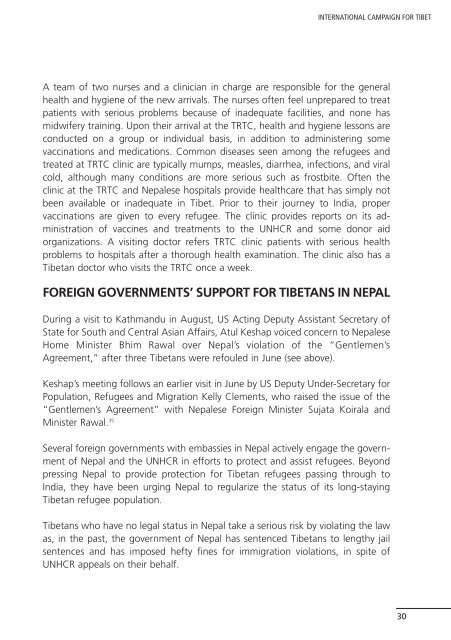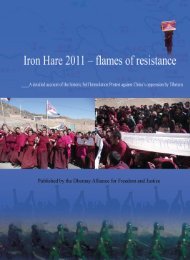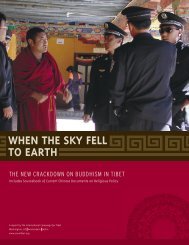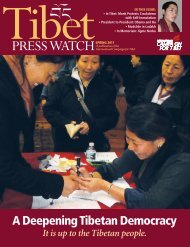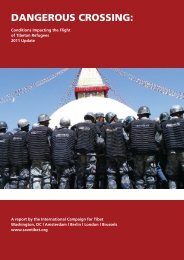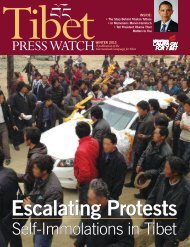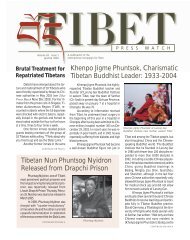DANGEROUS CROSSING: - International Campaign for Tibet
DANGEROUS CROSSING: - International Campaign for Tibet
DANGEROUS CROSSING: - International Campaign for Tibet
You also want an ePaper? Increase the reach of your titles
YUMPU automatically turns print PDFs into web optimized ePapers that Google loves.
INTERNATIONAL CAMPAIGN FOR TIBET<br />
A team of two nurses and a clinician in charge are responsible <strong>for</strong> the general<br />
health and hygiene of the new arrivals. The nurses often feel unprepared to treat<br />
patients with serious problems because of inadequate facilities, and none has<br />
midwifery training. Upon their arrival at the TRTC, health and hygiene lessons are<br />
conducted on a group or individual basis, in addition to administering some<br />
vaccinations and medications. Common diseases seen among the refugees and<br />
treated at TRTC clinic are typically mumps, measles, diarrhea, infections, and viral<br />
cold, although many conditions are more serious such as frostbite. Often the<br />
clinic at the TRTC and Nepalese hospitals provide healthcare that has simply not<br />
been available or inadequate in <strong>Tibet</strong>. Prior to their journey to India, proper<br />
vaccinations are given to every refugee. The clinic provides reports on its administration<br />
of vaccines and treatments to the UNHCR and some donor aid<br />
organizations. A visiting doctor refers TRTC clinic patients with serious health<br />
problems to hospitals after a thorough health examination. The clinic also has a<br />
<strong>Tibet</strong>an doctor who visits the TRTC once a week.<br />
FOREIGN GOVERNMENTS’ SUPPORT FOR TIBETANS IN NEPAL<br />
During a visit to Kathmandu in August, US Acting Deputy Assistant Secretary of<br />
State <strong>for</strong> South and Central Asian Affairs, Atul Keshap voiced concern to Nepalese<br />
Home Minister Bhim Rawal over Nepal’s violation of the “Gentlemen’s<br />
Agreement,” after three <strong>Tibet</strong>ans were refouled in June (see above).<br />
Keshap’s meeting follows an earlier visit in June by US Deputy Under-Secretary <strong>for</strong><br />
Population, Refugees and Migration Kelly Clements, who raised the issue of the<br />
“Gentlemen’s Agreement” with Nepalese Foreign Minister Sujata Koirala and<br />
Minister Rawal. 35<br />
Several <strong>for</strong>eign governments with embassies in Nepal actively engage the government<br />
of Nepal and the UNHCR in ef<strong>for</strong>ts to protect and assist refugees. Beyond<br />
pressing Nepal to provide protection <strong>for</strong> <strong>Tibet</strong>an refugees passing through to<br />
India, they have been urging Nepal to regularize the status of its long-staying<br />
<strong>Tibet</strong>an refugee population.<br />
<strong>Tibet</strong>ans who have no legal status in Nepal take a serious risk by violating the law<br />
as, in the past, the government of Nepal has sentenced <strong>Tibet</strong>ans to lengthy jail<br />
sentences and has imposed hefty fines <strong>for</strong> immigration violations, in spite of<br />
UNHCR appeals on their behalf.<br />
30


